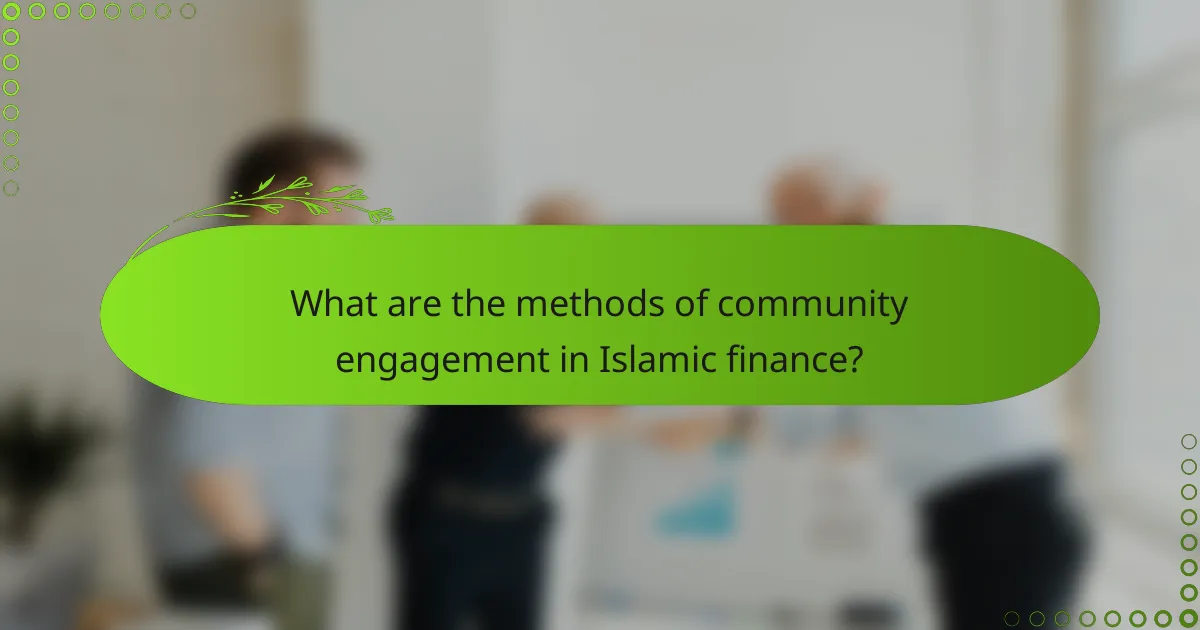
What is the Role of Community Engagement in Ethical Compliance within Islamic Finance?
Community engagement plays a crucial role in ethical compliance within Islamic finance. It fosters transparency and accountability among financial institutions. Engaging the community helps ensure that financial practices align with Islamic principles. This alignment is essential for maintaining trust and credibility. Community feedback can guide institutions in ethical decision-making. Additionally, it promotes awareness of Sharia-compliant practices. Studies highlight that institutions with strong community ties are more likely to adhere to ethical standards. Thus, community engagement enhances ethical compliance in Islamic finance significantly.
How does community engagement influence ethical compliance in Islamic finance?
Community engagement significantly influences ethical compliance in Islamic finance. Engaged communities promote adherence to Sharia principles. This interaction fosters transparency and accountability among financial institutions. When communities participate, they help shape ethical standards. Their feedback can lead to improved practices and policies. Research shows that institutions with strong community ties exhibit higher ethical compliance rates. For instance, a study by the Islamic Financial Services Board highlights the correlation between community involvement and adherence to ethical guidelines. Thus, community engagement serves as a vital mechanism for enhancing ethical compliance in Islamic finance.
What are the key principles of Islamic finance that relate to ethical compliance?
The key principles of Islamic finance that relate to ethical compliance are Shariah compliance, risk-sharing, and social justice. Shariah compliance ensures that all financial transactions adhere to Islamic law. This prohibits activities such as usury (riba) and investing in haram (forbidden) businesses. Risk-sharing promotes fairness by requiring that profits and losses be shared among parties involved in a transaction. This principle encourages ethical behavior and discourages exploitation. Social justice focuses on equitable distribution of wealth. It aims to reduce poverty and support community welfare through charitable giving (zakat) and ethical investments. These principles collectively foster a financial system that prioritizes ethical compliance and community engagement.
How does community engagement shape these principles?
Community engagement shapes ethical principles in Islamic finance by fostering transparency and accountability. Engaged communities contribute to the development of ethical standards. They provide feedback that reflects societal values and expectations. This direct involvement helps institutions align practices with community needs. Research indicates that community participation enhances trust and cooperation. A study by Ali et al. (2018) highlights that community feedback improves compliance with ethical guidelines. Engaged stakeholders can identify ethical dilemmas and suggest solutions. This collaborative approach strengthens the overall integrity of Islamic finance practices.
Why is community engagement important for ethical compliance?
Community engagement is crucial for ethical compliance as it fosters transparency and accountability. Engaged communities provide valuable feedback, ensuring that ethical standards align with societal values. This alignment enhances trust between financial institutions and their stakeholders. Moreover, active participation helps identify potential ethical dilemmas early. Research indicates that organizations with strong community ties are more likely to adhere to ethical practices. A study by the Institute of Business Ethics found that companies with high community engagement report fewer ethical breaches. Thus, community engagement serves as a proactive measure in maintaining ethical compliance within Islamic finance.
What are the potential consequences of lacking community engagement in Islamic finance?
Lacking community engagement in Islamic finance can lead to several negative consequences. One major consequence is the erosion of trust between financial institutions and the community. Trust is essential for the acceptance of Islamic finance products. Without it, community members may be reluctant to participate in these financial systems.
Additionally, there may be a lack of awareness regarding the principles of Islamic finance. This can result in misunderstandings about the products offered. Consequently, financial institutions may struggle to attract customers.
Moreover, the absence of community input can lead to misalignment between financial products and community needs. This misalignment can reduce the effectiveness of Islamic finance in promoting social welfare.
Lastly, insufficient community engagement may hinder the growth of Islamic finance markets. A lack of participation can limit the diversity of offerings available to consumers. This can stifle innovation and reduce the overall competitiveness of the sector.
How can community engagement enhance trust in Islamic financial institutions?
Community engagement enhances trust in Islamic financial institutions by fostering transparency and accountability. When institutions actively involve the community, they demonstrate commitment to ethical practices. This engagement allows for open communication about financial products and services. It helps to clarify misconceptions regarding Sharia-compliant finance. Furthermore, community involvement can lead to tailored financial solutions that meet local needs. Research indicates that institutions with strong community ties experience higher customer loyalty. A study by the Islamic Financial Services Board highlights that community engagement can significantly improve public perception. Trust is built when institutions show they value community input and feedback.

What are the methods of community engagement in Islamic finance?
Community engagement in Islamic finance involves several methods. These methods include educational initiatives, community workshops, and participatory decision-making. Educational initiatives aim to increase awareness of Islamic finance principles. Community workshops provide practical knowledge about financial products compliant with Sharia law. Participatory decision-making encourages stakeholders to contribute to financial planning. Additionally, feedback mechanisms are established to gather community insights. This approach fosters transparency and trust among participants. Research indicates that effective community engagement enhances ethical compliance in financial practices.
How do Islamic financial institutions engage with their communities?
Islamic financial institutions engage with their communities through various initiatives. They often provide financial education programs to enhance financial literacy. These institutions also support local businesses by offering interest-free loans and microfinance options. Additionally, they participate in charitable activities, aligning with Islamic principles of zakat (charity). Community development projects are frequently funded to improve local infrastructure. Islamic financial institutions also conduct outreach programs to better understand community needs. They collaborate with local organizations to address social issues. This engagement fosters trust and strengthens relationships within the community.
What role do educational initiatives play in community engagement?
Educational initiatives are crucial for fostering community engagement. They provide knowledge and skills necessary for active participation. Through workshops, seminars, and training, individuals gain awareness of community issues. This awareness encourages collaboration among community members. Educational programs also promote ethical understanding, particularly in contexts like Islamic finance. For instance, understanding ethical compliance can enhance trust within the community. Statistics show that communities with strong educational initiatives have higher engagement levels. Research indicates that informed citizens are more likely to participate in local governance and decision-making processes.
How can feedback mechanisms improve ethical compliance?
Feedback mechanisms enhance ethical compliance by facilitating open communication and accountability. They allow stakeholders to express concerns and provide insights on ethical practices. This two-way communication fosters a culture of transparency. Regular feedback can identify ethical lapses before they escalate. Studies show that organizations with strong feedback loops report higher compliance rates. For example, a 2020 survey by the Ethics & Compliance Initiative found that 78% of employees felt more empowered to report unethical behavior when feedback mechanisms were in place. Thus, effective feedback mechanisms are crucial for maintaining ethical standards.
What are the challenges of community engagement in Islamic finance?
Community engagement in Islamic finance faces several challenges. First, there is a lack of awareness about Islamic finance principles among the community. Many individuals do not fully understand the concepts of Sharia compliance. This gap in knowledge can lead to skepticism and reluctance to participate.
Second, diverse interpretations of Islamic law can create confusion. Different scholars may have varying opinions on what constitutes ethical financial practices. This can result in mixed messages for community members.
Third, limited access to Islamic financial products can hinder engagement. In many regions, such products are not readily available. This can restrict community members from participating in ethical financial practices.
Additionally, cultural barriers may exist. Some communities may have traditional financial practices that conflict with Islamic finance principles. This can create resistance to adopting new financial behaviors.
Finally, there is often a lack of effective communication strategies. Financial institutions may not effectively reach out to engage the community. This can further exacerbate misunderstandings and reduce participation in Islamic finance initiatives.
What barriers do Islamic financial institutions face in engaging communities?
Islamic financial institutions face several barriers in engaging communities. One significant barrier is a lack of awareness about Islamic finance principles among potential clients. Many individuals do not understand how Islamic finance operates, which hinders their participation. Additionally, cultural misconceptions about Islamic finance can create distrust. Some people associate Islamic finance with extremism, leading to reluctance in engagement. Regulatory challenges also exist, as Islamic financial products may not fit neatly within conventional legal frameworks. This can limit the ability of institutions to offer diverse services. Furthermore, competition from conventional financial institutions poses a challenge. These institutions often have established relationships and greater brand recognition. Finally, technological barriers can limit outreach efforts. Many Islamic financial institutions may lack the digital platforms necessary for effective community engagement.
How can these challenges be overcome to promote ethical compliance?
Challenges in promoting ethical compliance can be overcome through effective community engagement. Engaging communities fosters a sense of ownership and accountability among stakeholders. Regular dialogue between financial institutions and community members builds trust and transparency. Education initiatives can inform stakeholders about ethical standards and practices. Collaborative efforts can address specific cultural and social concerns within the community. Implementing feedback mechanisms allows for continuous improvement in ethical practices. Research indicates that community involvement enhances compliance rates significantly. For example, studies show that organizations with strong community ties report higher ethical adherence.

What are the outcomes of effective community engagement in Islamic finance?
Effective community engagement in Islamic finance leads to enhanced trust and collaboration among stakeholders. This engagement fosters a sense of ownership within the community. It encourages participation in financial decision-making processes. Increased transparency results from open communication channels. Community engagement also promotes financial literacy among participants. Educated stakeholders make informed decisions aligned with Islamic principles. Additionally, effective engagement can lead to the development of innovative financial products. These products often meet the unique needs of the community while adhering to ethical standards. Overall, the outcomes contribute to sustainable growth in Islamic finance.
How does community engagement lead to better ethical compliance outcomes?
Community engagement enhances ethical compliance outcomes by fostering trust and accountability. Engaged communities actively participate in the decision-making process. This involvement leads to a deeper understanding of ethical standards. When communities are informed, they hold organizations accountable for their actions. Research indicates that organizations with strong community ties report higher compliance rates. For instance, a study by the Harvard Business Review found that community engagement improves transparency. Increased transparency reduces instances of unethical behavior. Furthermore, engaged communities provide feedback that can guide ethical practices. This feedback loop helps organizations align with community values, reinforcing compliance.
What metrics can be used to measure the success of community engagement?
Metrics to measure the success of community engagement include participation rates, feedback quality, and stakeholder satisfaction. Participation rates reflect the number of individuals actively involved in community initiatives. High participation indicates effective engagement strategies. Feedback quality assesses the relevance and constructiveness of comments received from the community. Positive feedback suggests that the community feels heard and valued. Stakeholder satisfaction measures the contentment of key community members with engagement efforts. Surveys can quantify satisfaction levels, providing concrete data. These metrics together offer a comprehensive view of community engagement effectiveness.
How can successful case studies inform future practices in Islamic finance?
Successful case studies can inform future practices in Islamic finance by providing practical examples of ethical compliance. These case studies illustrate successful implementations of Sharia-compliant financial products. They highlight best practices in community engagement and ethical decision-making. Furthermore, they showcase the impact of transparency and accountability on stakeholder trust.
For instance, the case study of Al Baraka Bank demonstrates effective community involvement in product development. This approach led to enhanced customer satisfaction and loyalty. Additionally, the case of Qatar Islamic Bank shows how adherence to ethical standards can improve financial performance.
Such examples serve as benchmarks for other institutions. They can adopt similar strategies to foster ethical compliance. Overall, successful case studies provide valuable insights that can guide future practices in Islamic finance.
What best practices should be adopted for effective community engagement?
Effective community engagement requires clear communication and active participation. Establishing open channels for dialogue fosters trust. Regularly scheduled meetings encourage consistent involvement. Utilizing surveys collects valuable feedback from community members. Providing accessible information ensures everyone can participate. Collaborating with local leaders enhances credibility and outreach. Creating inclusive spaces promotes diverse perspectives. Tracking engagement metrics helps assess effectiveness and adjust strategies.
What strategies can Islamic financial institutions implement to foster community relationships?
Islamic financial institutions can implement several strategies to foster community relationships. They can engage in community development projects that align with Islamic values. This may include funding education initiatives, healthcare services, or infrastructure improvements.
Additionally, these institutions can establish partnerships with local organizations. Collaborating with non-profits can enhance their outreach and impact. Offering financial literacy programs is another effective strategy. Educating community members about financial products promotes inclusivity.
Moreover, Islamic financial institutions can host community events. These gatherings facilitate direct interaction with community members. Transparency in operations builds trust and strengthens relationships. Regular feedback mechanisms allow institutions to understand community needs better.
Research indicates that community engagement positively affects customer loyalty and trust. A study by the International Journal of Islamic and Middle Eastern Finance and Management highlights the importance of social responsibility in Islamic finance.
How can transparency and communication enhance community trust?
Transparency and communication enhance community trust by fostering openness and accountability. When organizations share information clearly, it reduces uncertainty among community members. This openness allows individuals to feel informed about decisions impacting them. Effective communication builds relationships by encouraging dialogue and feedback. Trust increases when communities perceive that their voices are heard and valued. Studies show that transparent practices lead to higher satisfaction and engagement levels. For example, a survey by the Institute for Public Relations found that 85% of respondents believe transparency builds trust in organizations. Thus, transparency and communication are essential for nurturing trust within communities.
The main entity of this article is community engagement within Islamic finance, specifically its role in promoting ethical compliance. The article outlines how community engagement fosters transparency, accountability, and adherence to Sharia principles, which are essential for maintaining trust between financial institutions and stakeholders. It discusses the influence of community feedback on ethical decision-making, the principles of Islamic finance related to ethical compliance, and the methods through which institutions can engage with their communities. Additionally, it addresses the challenges faced in community engagement and the potential consequences of lacking such involvement, emphasizing the importance of collaboration for enhancing ethical standards in Islamic finance.